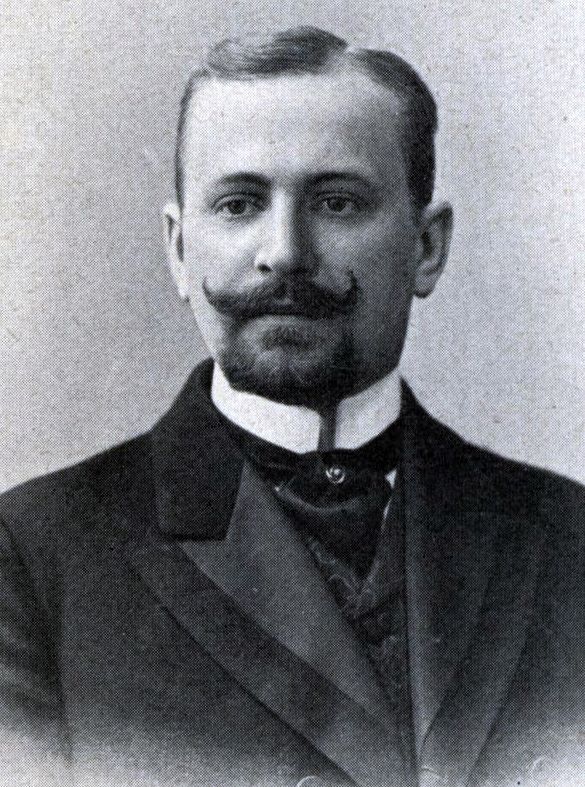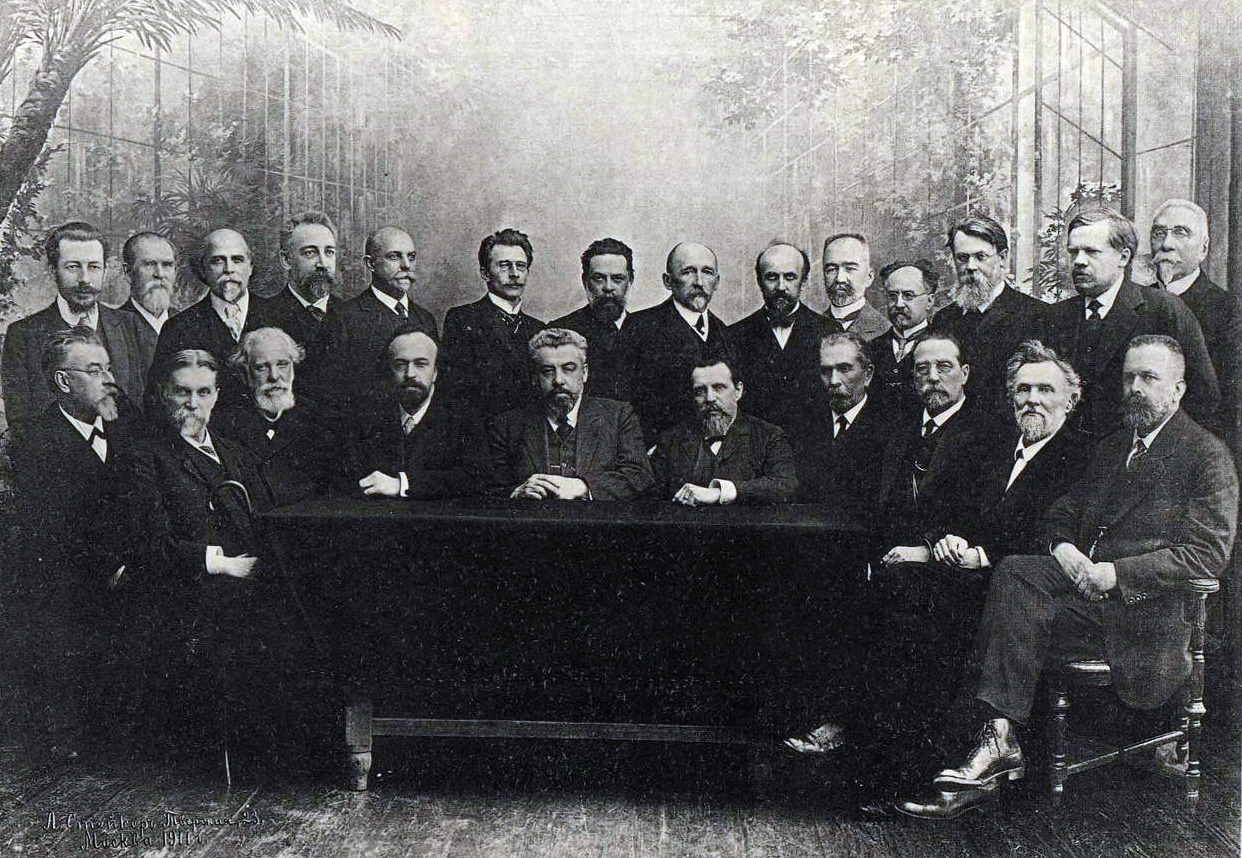|
Moscow Higher Courses For Women
The Higher Courses for Women in Moscow () was a university for women between 1872 and 1918 (with a break in 1888-1900), after which they were transformed into the 2nd Moscow State University. It was one of the largest and most prominent women's higher education institutions in the Russian Empire, second only to the Bestuzhev Courses in Saint Petersburg. It was founded and administered by Vladimir I. Guerrier. Historical information First period (1872-1888) At the beginning of 1871, the supernumerary professor of general history of Moscow University , V.I. Guerrier, sent a note to the trustee of the Moscow educational district, Prince A.P. Shirinsky-Shikhmatov , about the advisability of opening higher women's courses in Moscow, to which he added the draft "Regulations on Higher Women's Courses", in which he outlined the purpose and program of the created courses. Guerrier persuaded the Minister of Public Education Count Dmitry A. Tolstoy to sanction a higher school for w ... [...More Info...] [...Related Items...] OR: [Wikipedia] [Google] [Baidu] |
Kozma Soldatyonkov
Kozma Terentyevich Soldatyonkov (russian: Козьма Терентьевич Солдатёнков; 22 October 1818 in Moscow, Russian Empire – 1 June 1901 in Kuntsevo, Moscow, Russian Empire) was a Russian industrialist, mecenate, philanthropist, art collector and a renowned publisher.Солдатёнков, Кузьма Терентьевич at Moscow. The Encyclopedian Dictionary // Москва. Энциклопедический справочник. — М.: Большая Российская Энциклопедия. 1992. In 1865 the Soldatyonkov Publishing house was launched. Among its seminal publications were the Complete Works by |
Devichye Pole
Devichye Pole (russian: links=no, Девичье поле, , Maidens' Field) is a historical medical campus, built between 1887 and 1897 in Khamovniki District of Moscow, Russia, to the master plan of Konstantin Bykovski. It is located between the Garden Ring and Novodevichy Convent. Originally the medical department of Moscow State University, it is now split between Moscow Medical Academy, Russian State Medical University and various state and private clinics. The territory also includes Russian State Archives and Devichye Pole park. History Early history Devichye Pole acquired its name from Novodevichy Convent (established 1524). In the 17th century, it housed a court garden for medicinal herbs, and later the court of Eudoxia Lopukhina, estranged first wife of Peter I. Thus, the main street (now Bolshaya Pirogovskaya) was called ''Tsarytsinskaya''. In the late 18th century, Trubetskoy, Apraksin and other families set their country estates in Devichye Pole; the place remained ... [...More Info...] [...Related Items...] OR: [Wikipedia] [Google] [Baidu] |
Olga Tsuberbiller
Olga Tsuberbiller (russian: Ольга Николаевна Цубербиллер, - 28 September 1975) was a Russian mathematician noted for her creation of the textbook ''Problems and Exercises in Analytic Geometry''. The book has been used as a standard text for high schools since its creation in 1927. Sophia Parnok, noted Russian poet dedicated her verses in the ''Half-voiced'' cycle to Tsuberbiller, and the educator cared for Parnok during her final illness, later becoming her literary executor. She later became the partner of the noted opera singer, Concordia Antarova. Tsuberbiller was designated as an Honored Scientist of the Russian Soviet Federative Socialist Republic in 1955. Early life Olga Nikolaevna Gubonina (russian: Ольга Николаевна Губонина) was born on 7 September 1885 in Moscow to Nadezhda Konstantinovna Artyukhova (russian: Надежда Константиновна Артюхова) and Nikolai Petrovich Gubonin (russian: Никола� ... [...More Info...] [...Related Items...] OR: [Wikipedia] [Google] [Baidu] |
Bogdan Kistyakovski
Bogdan Aleksandrovich Kistyakovski (Russian: Богдан Александрович Кистяковский; 16 November 1869 – 16 April 1920) was a Ukrainian philosopher, jurist, and sociologist. He reached prominence with his ''Gesellschaft und Einzelwesen'' (Society and Individuals) published in Berlin in 1899. Philosophically he defended transcendental idealism. In 1902 he contributed to '' Problems of Idealism'' (''Problemy Idealizma''), edited by Pavel Novgorodtsev. In 1909 he contributed the essay "In Defense of Law" to the anthology ''Vekhi'' (Landmarks). Biography Early life Bogdan Kistyakovski was born in Kiev, Kiev Governorate of the Russian Empire on 16 November 1869. His father, Aleksandr Fedorovich Kistyakovski, was a professor of criminal law at the University of Kiev and the president of the Legal Society of Kiev. Kistyakovski later remarked that he felt he had always struggled for his Ukrainian national identity and that he had been 'Russianized'. Educa ... [...More Info...] [...Related Items...] OR: [Wikipedia] [Google] [Baidu] |
Ivan Ilyin
Ivan Alexandrovich Ilyin or Il'in (Ива́н Алекса́ндрович Ильи́н, – 21 December 1954) was a Russian jurist, a dogmatic religious and political philosophy, political philosopher, an orator and conservative Monarchism, monarchist. He perceived the February Revolution as a "temporary disorder", and the October Revolution as a "national catastrophe", and actively joined the struggle against the Bolsheviks, Bolshevik regime. He became a white émigré journalist, a Slavophilia, Slavophile and an ideologue of the Russian All-Military Union. As an anti-communism, anti-communist, Ilyin initially defended Hitler but his critique of totalitarianism was not at all appreciated by the Nazi regime. Moreover, in 1934 he refused to accept their orders to spread Nazi propaganda in the Russian Academic Institute and was subsequently removed from his post and banned from all further employment. While Ilyin lost his main source of income, Sergei Rachmaninoff helped him fin ... [...More Info...] [...Related Items...] OR: [Wikipedia] [Google] [Baidu] |
Boleslav Mlodzeevskii
Boleslav Kornelievich Mlodzeevskii, also Mlodzievskii (russian: Болеслав Корнелиевич Млодзиевский, Pre-Reform Russian: Млодзѣевскій; born , died January 18, 1923) was a Russian mathematician, a former president of the Moscow Mathematical Society. He was working in differential and algebraic geometry. Biography Mlodzeevskii was born in Moscow July 10, 1858. His father was a doctor, a professor at Moscow University; he died when Boleslav was seven. After finishing Moscow gymnasium with a gold medal, he studied at Moscow University, where he received a Ph.D. degree in mathematics in 1886, in differential geometry. In his dissertation he studied the problem of deformation of surfaces; his advisor was Vasily Zinger. After two years of studies and work in Göttingen, Paris and Zürich, he return to Moscow to assume a professorship at Moscow University. With a short gap 1911-1917 when he was forced to leave, he continued working at t ... [...More Info...] [...Related Items...] OR: [Wikipedia] [Google] [Baidu] |
Alexander Eichenwald
Alexander Alexandrovich Eichenwald (russian: Александр Александрович Эйхенвальд 4 January 1864 – 12 September 1944) was a Russian experimental physicist who worked on electrodynamics. He conducted experiments on electromagnetism, electrical fields, and on the construction of instruments to measure magnetic fields. His most famous experiment, following those of Wilhelm Röntgen, examined the predictions of James Clerk Maxwell. Named after them as the Röntgen-Eichenwald experiment, this demonstrated that the movement of static charges was no different from electric currents in that they produced an electromagnetic field. Eichenwald was born in St. Petersburg where his father was an artistic portrait photographer while his mother was a musician. An interest in music among the children made him interested in acoustics. While at high school he became a friend of P. N. Lebedev and graduated from Moscow University in physics and mathematics. He then jo ... [...More Info...] [...Related Items...] OR: [Wikipedia] [Google] [Baidu] |
Nikolay Zelinsky
Nikolay Dmitriyevich Zelinsky (; 6 February 1861 – 31 July 1953) was a Russian Empire, Russian and USSR, Soviet chemist. Academician of the Academy of Sciences of the Soviet Union (1929). Zelinsky studied at the University of Odessa and at the universities of Leipzig and Göttingen in Germany. Zelinsky was one of the founders of theory on Organic chemistry, organic catalysis. He was the inventor of the first effective filtering activated charcoal gas mask in the world (1915). Life Nikolai Zelinsky was born on 25 January (February 6, 6 February) 1861 in Tiraspol in a noble family. His father Dmitry Osipovich Zelinsky who came from hereditary Volyn nobles, died of rapidly developing consumption in 1863; two years later his mother died of the same disease. The orphaned boy was left in the care of his grandmother M.P. Vasilyeva and he spent his childhood in her village. At the age of ten, Nikolai Zelinsky entered the Tiraspol district school for two-year courses to prepare for ent ... [...More Info...] [...Related Items...] OR: [Wikipedia] [Google] [Baidu] |
Sergey Nametkin
Sergey Semyonovich Nametkin (russian: Сергей Семёнович Намёткин; – 5 August 1950) was a Russian organic chemist, a prominent researcher in terpene chemistry, the cracking of petrochemicals, and rearrangement of camphene Camphene is a bicyclic organic compound. It is one of the most pervasive monoterpenes. As for other terpenes, it is insoluble in water, flammable, colorless, and has a pungent smell. It is a minor constituent of many essential oils such as tur ...s. Biography Nametkin was born in Kazan and orphaned at an early age. He was educated at a gymnasium in Moscow, after which he earned a living as a private tutor. He studied chemistry and became a lecturer in organic chemistry at the Moscow University but quit in 1911 to oppose the policies of L.A. Kasso. He then studied under N.D. Zelinsky, and received a doctorate in 1917. In 1927 he went to the Moscow Mining Academy and became a director of the Institute of Petroleum in 1948. Name ... [...More Info...] [...Related Items...] OR: [Wikipedia] [Google] [Baidu] |
Sergey Chaplygin
Sergey Alexeyevich Chaplygin (russian: Серге́й Алексе́евич Чаплы́гин; 5 April 1869 – 8 October 1942) was a Russian and Soviet physicist, mathematician, and mechanical engineer. He is known for mathematical formulas such as Chaplygin's equation and for a hypothetical substance in cosmology called Chaplygin gas, named after him. He graduated in 1890 from Moscow University, and later became a professor. He taught mechanical engineering at Moscow Higher Courses for Women in 1901, and of applied mathematics at Moscow School of Technology, 1903. He was appointed Director of the courses in 1905. Leonid I. Sedov was one of his students. Chaplygin's theories were greatly inspired by N. Ye. Zhukovsky, who founded the Central Institute of Aerodynamics. His early research consisted of hydromechanics. His "Collected Works" in four volumes were published in 1948. Honours and awards * Hero of Socialist Labour (1 February 1941) * Two Orders of ... [...More Info...] [...Related Items...] OR: [Wikipedia] [Google] [Baidu] |
Vladimir Vernadsky
Vladimir Ivanovich Vernadsky (russian: link=no, Влади́мир Ива́нович Верна́дский) or Volodymyr Ivanovych Vernadsky ( uk, Володи́мир Іва́нович Верна́дський; – 6 January 1945) was a Russian, Ukrainian and Soviet mineralogist and geochemist who is considered one of the founders of geochemistry, biogeochemistry, and radiogeology. He was one of the founders and the first president of the Ukrainian Academy of Sciences (now National Academy of Sciences of Ukraine). Vladimir Vernadsky is most noted for his 1926 book ''The Biosphere'' in which he inadvertently worked to popularize Eduard Suess' 1885 term biosphere, by hypothesizing that life is the geological force that shapes the earth. In 1943 he was awarded the Stalin Prize. Vernadsky's portrait is depicted on the Ukrainian ₴1,000 hryvnia banknote. Early life Vernadsky was born in Saint Petersburg, Russian Empire, on in the family of the native Kyiv residents Russi ... [...More Info...] [...Related Items...] OR: [Wikipedia] [Google] [Baidu] |




